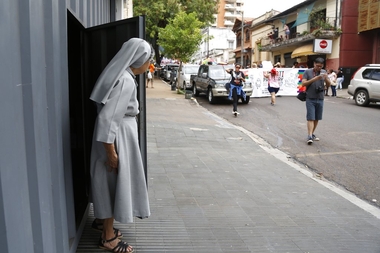Fears rise over LGBT discrimination in conservative Paraguay

ASUNCION, Paraguay (AP) — Mariana Sepulveda has been stabbed on the street, detained by police and expelled from her high school — all for being transgender in Paraguay, one of the most sexually conservative countries in Latin America.
"I've felt hate for not being heterosexual," said Sepulveda, 32, who now works for an advocacy group. "Raising a family, having a partner, adopting children seems out of reach because there are no legal conditions for us in Paraguay."
Advocacy groups fear the stigma and attacks on the LGBQT community could get worse now that the education minister has banned classes about sexual diversity in schools and even volunteered to help burn all books related to the subject.
The ban was implemented in October after schools began using a United Nations Children's Fund guidebook for teachers on avoiding discrimination between girls and boys and achieving gender equality.
"We're not going to promote gender ideology," Education Minister Enrique Riera told local media earlier this year. "We're going to base ourselves on what is expressed in the constitution, which says that marriage is between a man and a woman."
Gay rights groups say the ban goes against Paraguay's constitution because it is discriminatory and ignores the recommendations by UNICEF and other international organizations.
"We're living a sad time of religious fundamentalism, intolerance and hate that places this country as the most homophobic one of the region," Somos Gay, a Paraguayan gay rights group, said in a statement. It added that "this situation has an impact on human lives. Hate crimes, bullying and violence are the disastrous consequences of this encouragement of homophobia."
Conservative institutions such as the Catholic Church retain a strong influence in Paraguay.
"There's the indifference of the state toward sexual minorities to avoid confronting the church," said Ramon Corvalan, a Paraguayan anthropologist. "The lay state thing is just a statement in the constitution. The church is still strong here."
President Horacio Cartes has also been criticized for his attitudes toward the LGBQT community. Just months before he was elected in 2013, he compared gay people to monkeys and said he would rather shoot himself in the testicles before his son married a man. Cartes later apologized, but the comments have not seemed to hurt his political career.
The ban on teaching about sexual diversity may further stall Paraguay's embrace of LGBQT rights.
At a school on the outskirts of Asuncion, students wrote a report seeking to prove that homosexuality is a "social problem." After it went viral on social media, the school principal, Margarita Aquino, apologized and acknowledged that in Paraguay's "public schools, sexual education doesn't exist."
But the leaders of some communities say they prefer it this way.
"We don't support same-sex marriage because it's not natural, and we oppose that in our schools they teach our boys and girls that being gay, trans or lesbian is a choice," said Carolina Aranda, mayor of the city of Mariano Roque Alonso. "I'm not homophobic; I have gay friends. But I don't want them to teach kids things that are not normal."
By PEDRO SERVIN, Associated Press
Copyright Associate Press. All rights reserved.
The Gayly 12/14/2017 @2:25 p.m.





